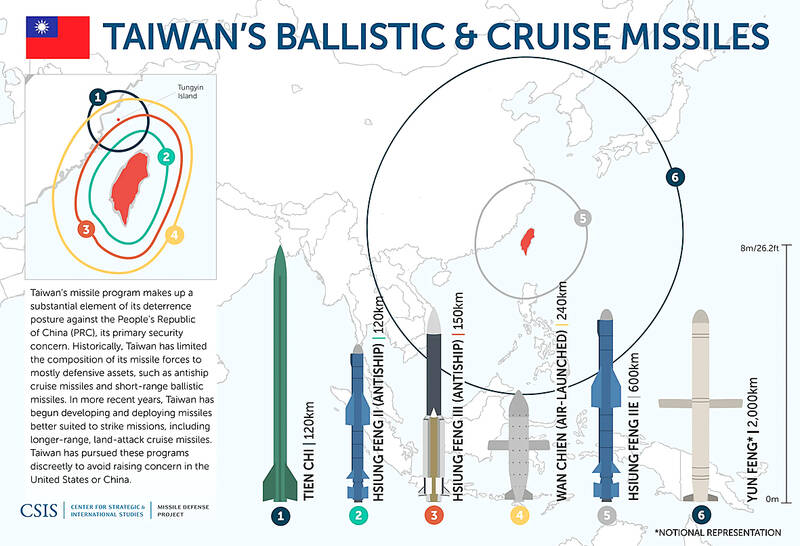Former Chungshan Institute of Science and Technology (CSIST) president Kung Chia-cheng (龔家政) made known some behind-the-scenes details of the nation’s missile development in a memoir published by Academia Sinica’s Institute of Modern History last month.
Speaking about the supersonic cruise missile developed by the Yun Feng (雲峰, Cloud Peak) project, Kung said the missile could exceed Mach 3 and had excellent penetration, as it comes down on its target vertically.
The missile’s speed ensures that it is not easily intercepted, and at the time of the missile’s development, under former president Lee Teng-hui (李登輝), only the US and Russia were developing similar kinds of missiles, Kung said.

Photo: screen grab from CSIS Web site
The Ministry of National Defense had nearly axed the project as it thought the missile would have a high possibility of failing its trial launch, he said.
Fortunately, former president Chen Shui-bian (陳水扁) had conducted an inspection of CSIST during his presidency, and the institute briefed the president and received support to continue the project, he added.
Nearly 400 CSIST members worked on a secret project to develop ballistic missile capabilities under the overarching “Tien Kung” project. It was the first time that Taiwan developed a missile that was 1m in diameter and 10m in height, Kung said, adding that Chen was impressed when he inspected the missile at Pingtung County’s Jiupengwan (九鵬灣) missile test base.
The American Institute in Taiwan met with Chen soon after the trial launch of the missile, he said, adding that the institute issued a memorandum of understanding stating that we “were not allowed to have carried out the trial launch.”
Kung said that even if the project had been successful, it would simply have been a demonstration that the CSIST could make ballistic missiles, and it would have taken more trials for the project to produce combat-ready weapons.
Kung also spoke about the Hsiung Feng II-E missile, which has two variants: type A, which has a range of 500km, and type B, which has a range of 1,000km.
Officials had been pleased with the successful results of the Hsiung Feng II-E type B simulation, he said.

CHANGING LANDSCAPE: Many of the part-time programs for educators were no longer needed, as many teachers obtain a graduate degree before joining the workforce, experts said Taiwanese universities this year canceled 86 programs, Ministry of Education data showed, with educators attributing the closures to the nation’s low birthrate as well as shifting trends. Fifty-three of the shuttered programs were part-time postgraduate degree programs, about 62 percent of the total, the most in the past five years, the data showed. National Taiwan Normal University (NTNU) discontinued the most part-time master’s programs, at 16: chemistry, life science, earth science, physics, fine arts, music, special education, health promotion and health education, educational psychology and counseling, education, design, Chinese as a second language, library and information sciences, mechatronics engineering, history, physical education

The Chinese military has boosted its capability to fight at a high tempo using the element of surprise and new technology, the Ministry of National Defense said in the Quadrennial Defense Review (QDR) published on Monday last week. The ministry highlighted Chinese People’s Liberation Army (PLA) developments showing significant changes in Beijing’s strategy for war on Taiwan. The PLA has made significant headway in building capabilities for all-weather, multi-domain intelligence, surveillance, operational control and a joint air-sea blockade against Taiwan’s lines of communication, it said. The PLA has also improved its capabilities in direct amphibious assault operations aimed at seizing strategically important beaches,

New Taipei City prosecutors have indicted a cram school teacher in Sinjhuang District (新莊) for allegedly soliciting sexual acts from female students under the age of 18 three times in exchange for cash payments. The man, surnamed Su (蘇), committed two offenses in 2023 and one last year, the New Taipei District Prosecutors’ Office said. The office in recent days indicted Su for contraventions of the Child and Youth Sexual Exploitation Prevention Act (兒童及少年性剝削防制條例), which prohibits "engaging in sexual intercourse or lewd acts with a minor over the age of 16, but under the age of 18 in exchange for

The High Prosecutors’ Office yesterday withdrew an appeal against the acquittal of a former bank manager 22 years after his death, marking Taiwan’s first instance of prosecutors rendering posthumous justice to a wrongfully convicted defendant. Chu Ching-en (諸慶恩) — formerly a manager at the Taipei branch of BNP Paribas — was in 1999 accused by Weng Mao-chung (翁茂鍾), then-president of Chia Her Industrial Co, of forging a request for a fixed deposit of US$10 million by I-Hwa Industrial Co, a subsidiary of Chia Her, which was used as collateral. Chu was ruled not guilty in the first trial, but was found guilty